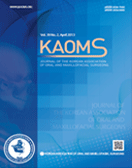Journal of the Korean Association of Oral and Maxillofacial Surgeons
- P-ISSN2234-7550
- E-ISSN2234-5930
- SCOPUS, KCI, ESCI
 ISSN : 2234-7550
ISSN : 2234-7550
Overnight hospital stay and/or extended recovery period may allow long-duration oral and maxillofacial surgeries in the operating room of a dental hospital in an outpatient setting: a single-center experience
Aysun Ankay Yilbas (Hacettepe University School of Medicine)
Basak Akca (Hacettepe University School of Medicine)
Demet Basak Ozkaragoz (Hacettepe University School of Medicine)
Selen Adiloğlu (Hacettepe University Faculty of Dentistry)
Hıfzı Hakan Tuz (Hacettepe University Faculty of Dentistry)
Meral Kanbak (Hacettepe University School of Medicine)
Abstract
Objectives: The requirement for overnight hospital stay should be considered preoperatively according to patient-related factors, type of surgery, and anesthetic management plan. In this study, we aimed to define the major factors that influence consideration of overnight hospital stay in patients undergoing oral and maxillofacial (OMF) surgery in an operating room (OR) of a dental hospital in an outpatient setting. Materials and Methods: The records of patients who underwent oral procedures under general anesthesia between 2014-2017 were reviewed. Results: A total of 821 patients underwent oral procedures under general anesthesia; 631 of them underwent OMF surgery in the OR of a dental hospital, and 174 of these patients were hospitalized for overnight stay. There was no significant difference in the number of patients with comorbidities between the outpatient and hospitalized patient groups (P=0.389). The duration of surgery was longer in the hospitalized patient group (105.25±57.48 vs 189.62±82.03 minutes; P<0.001). Double-jaw (n=15; 310.00±54.21 minutes) and iliac crest grafting surgeries (n=59; 211.86±61.02 minutes) had the longest durations. Patients who underwent iliac crest grafting had the highest rates of hospitalization (79%). The overall recovery period was longer in outpatients (119.40±41.60 vs 149.83±52.04; P<0.001). Conclusion: Duration of surgery was the main determinant in considering whether a patient required overnight hospital stay. However, patients with an American Society of Anesthesiology physical status score <3 may be scheduled for OMF surgery in the OR of a dental hospital in an outpatient setting regardless of duration of surgery if overnight hospital stay is planned or an extended recovery period is provided until patients meet the discharge criteria.
- keywords
- Anesthesia, Inpatients, Oral and maxillofacial surgery, Outpatients
- 다운로드 수
- 조회수
- 0KCI 피인용수
- 0WOS 피인용수